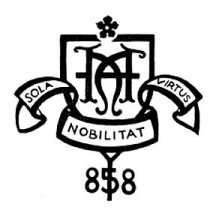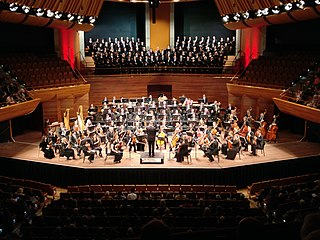Related Research Articles

The Morriston Orpheus Choir, based in Morriston, near Swansea, Wales, is a male voice choir, one of the best-known in the UK.
"Mairi's Wedding" is a Scottish folk song originally written in Gaelic by John Roderick Bannerman (1865–1938) for Mary C. MacNiven (1905–1997) on the occasion of her winning the gold medal at the National Mòd in 1934. In 1959, James B. Cosh devised a Scottish country dance to the tune, which is 40 bars, in reel time.

Hamilton Academy was a school in Hamilton, South Lanarkshire, Scotland.
The Harvard University Choir, more commonly referred to as the University Choir or simply UChoir, is Harvard University's oldest choir. It has provided choral music for the Harvard Memorial Church and its predecessor church for over 180 years, and is Harvard's only professional choir. Each year, a select group of choristers also make up the Harvard Choral Fellows, who sing at the church's daily Morning Prayers service in Appleton Chapel.
Sir Philip Stevens Ledger, CBE, FRSE was an English classical musician, choirmaster and academic, best remembered as Director of the Choir of King's College, Cambridge in 1974–1982 and of the Royal Scottish Academy of Music and Drama from 1982 until he retired in 2001. He also composed choral music and played the organ, piano and harpsichord.
The Kansas City Chorale is a professional 27-voice chorus conducted by Charles Bruffy. They perform a four concert series in Kansas City, tour nationwide, and perform with their sister choir, the Phoenix Chorale, also conducted by Mr. Bruffy. During his tenure as conductor, the chorus has achieved international acclaim. Mr. Bruffy, renowned for his fresh interpretations of both traditional and new music, was noted by The New York Times as a disciple of the late Robert Shaw.
Roberton may refer to:
The Westminster Williamson Voices is an ensemble that specializes in choral music. It is named for Westminster Choir College's founder, John Finley Williamson, who believed that choral music performed at the highest level should be accessible to all. The Choir is directed by conductor, pedagogue, and writer Dr.James Jordan
The Dashing White Sergeant is a Scottish country dance, performed to a similarly titled piece of music. The dance is in 4/4 time, thus it is in the form of a reel. The dance is performed by groups of six dancers and is progressive.
Sir Hugh Stevenson Roberton was a Scottish composer and, as founder of the Glasgow Orpheus Choir, one of Britain's leading choral-masters in the first half of the 20th century.
John Butt is an English orchestral and choral conductor, organist, harpsichordist and scholar. He holds the Gardiner Chair of Music at the University of Glasgow and is music director of the Dunedin Consort with whom he has made award-winning recordings in historically informed performance. He is a prolific scholar, conductor and performer of works by Johann Sebastian Bach.

Arthur William Oldham OBE was an English composer and choirmaster. He founded the Edinburgh Festival Chorus in 1965, the Chorus of the Orchestre de Paris in 1975, and the Concertgebouw Orchestra Chorus in Amsterdam in 1979. He also worked with the Scottish Opera Chorus 1966–74 and directed the London Symphony Chorus 1969–76. For his work with the LSO Chorus, he won three Grammy Awards. He was also a composer, mainly of religious works, but also a ballet and an opera.
Cadenza is a mixed-voice chamber choir based in Edinburgh, Scotland. The choir was formed in 1992 and quickly gained a reputation for a high standard of performance, winning the Scotland and North England heat of the Sainsbury's Choir of the Year competition in 1996 and 1998. The current musical director is Timothy Coleman.
Peter Mooney was a Scottish educator and conductor of the renowned Glasgow Phoenix Choir.
The Bearsden Choir is an amateur choir of some 120 mixed adult voices based in Glasgow, Scotland. It was formed in 1968 and performs both sacred and secular classical choral works. The singer Jamie MacDougall is its Honorary President. The choir has members of all ages and welcomes new singers. Auditions are held for applicants.
Events from the year 1906 in Scotland.
The Royal Scottish National Orchestra Chorus, or RSNO Chorus for short, is a choir based in Scotland and founded in 1843. Its main role is to perform alongside the Royal Scottish National Orchestra. The chorus holds open rehearsals for potential new members, rehearses on Wednesdays in Glasgow, and has also toured around the world. It is directed by Gregory Batsleer.
J. Michael Diack was a Scottish musician, superintending the teaching of music in the Glasgow area. His activities were varied: he founded the Glasgow Bach Choir in 1906; he made English translations of choral works by Bach and Handel; he was instrumental in founding the Royal Scottish Country Dance Society and publishing their music; and, in his own compositions, he arranged nursery rhymes in the style of Handel.

The Orpheus Choir of Wellington is an auditioned mixed-voice symphonic choir based in Wellington, New Zealand. It has over 150 members and regularly performs with the New Zealand Symphony Orchestra and Orchestra Wellington.

Mary Connell MacNiven, born McNiven and sometimes billed as Mrs Campbell/Mrs John Campbell was an award-winning Gaelic singer and the inspiration behind the famous Scottish song Mairi's Wedding.
References
- ↑ "No. 33675". The London Gazette (Supplement). 30 December 1930. pp. 1–18.
- ↑ Phoenix Choir. Retrieved 7 January 2018